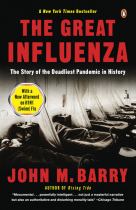Author: Webmaster (Page 42 of 92)
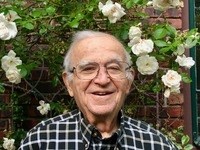 Gilbert Alexandre
Gilbert Alexandre
Gilbert Alexandre, born in Luxembourg May 26, 1935 and longtime resident of Darien, died peacefully Sunday morning August 2, 2020. While his passing is a sad day for us all Gil had a kind and generous soul who lived his life to the fullest leaving the fondest of memories for everyone who knew him.
As a six year old in 1941, Gil immigrated to the US through Ellis Island. This first of his many adventures began after his father Emmanuel made the decision to move the family to the US given the situation with the war in Europe. The family travelled to Marseille where they secured emigration papers to the US and formulated their plans to make the trip during those dangerous times. The family found passage on a boat taking them to the coast of Tunisia and from there a train to Casablanca. Outside Casablanca they spent time in a displaced persons camp while Gil’s father arranged passage to the US on a Portuguese tramp steamer. This next leg of the adventure took 28 days including a one week stop in Havana during which they could not leave the ship. Ultimately Gil & his family arrived in New York City where Gil recalled being taken on deck to see the Statue of Liberty.
His first few years in New York were spent at PS9, learning English, making friends and attending summer camp in Westchester. For the next decade Gil became a true New Yorker until he left town to attend Brown University where he received his bachelor’s degree in International Relations. From there he spent time learning the ropes at Marshall Fields in Chicago before joining the Army in 1956. On several occasions Gil mentioned particularly fond memories of his days in boot camp at Ft. Devens in Massachusetts and being stationed in Hawaii where he leveraged his card playing skills teaching Contact Bridge. After the Army, Gil returned to New York where he received his MBA from Columbia University. Gil spent the next five decades building and running his own businesses and enjoying life with family and friends who now miss him greatly.
Among his many passions he owned/operated a large department store, Nouveau Paris, in Luxembourg City that was founded by his grandfather Emile. A big part of his life for many years he managed the store from afar along with his mother Denyse, flying back and forth to Europe, as well as spending a month every summer there managing the store from 1968 until the early 1980’s.
He was a founding member of the Consumer Analyst Group of New York (CAGNY) and a Securities Analyst at Chase Investors Management Corp as well as Merrill Lynch before striking out on his own in the early 1980’s.
Gil brought adventure & humor into all our lives. From being a lifeguard at Craigville Beach on Cape Cod during college to scuba diving to photography to travelling the world to his great love of reading he always greeted everyone with a handshake and parted ways with “cheers”. Gil would often be seen in one of his many berets, always a bow tie and no holiday was complete without his favorite, foie gras! He loved spending time with the grandchildren hearing about what they were learning in school, projects they worked on and the books they were reading.
Gil was predeceased by his parents Denyse & Emmanuel Alexandre and is survived by his wife Julie Forrester-Alexandre, son Phil Alexandre & grandchildren Johnny & Nicole, daughter Daryl Whitmoyer (William) & grandchildren Kate & Turner, Julie’s daughter Dagny Forrester & grandson Nate, son Mark Forrester (Tricia) & grandchildren Kirsten, Caroline & Sarah.
A memorial service will be planned in the future once safe for family and friends to gather. He will be laid to rest with his parents in Paris.

Gents,
We have some times reserved for a golf outing at Sterling Farms. The date is Tuesday 25 August at 11am. Cost will be $51 with a cart (single occupant). Before fully securing this reservation, I want to get a sense for the number of you who are likely to play.
If you are interested, please respond to me directly: picarnes@gmail.com. This is just an indication for planning purposes. Once we reach a critical mass, I will contact you again with an official invitation.
Peter Carnes
Your Host: Bob Baker
Discussion Leader: David Mace
Our current affairs group will talk about income inequality in America and what we should do about it.
The Black-White Wage Gap Is as Big as It Was in 1950
https://www.nytimes.com/2020/06/25/opinion/sunday/race-wage-gap.html?referringSource=articleShare
https://en.wikipedia.org/wiki/List_of_countries_by_income_equality
Racism’s Hidden Toll
How does income inequality affect our lives
Video recording of the discussion: https://youtu.be/8x4ej7hyeA4
Michael Avery Poler
Michael Avery Poler passed away peacefully at his home in Norwalk, Connecticut on July 1, 2020, surrounded by family, including his wife of 42 years Petrea. Michael was born on September 23, 1935 in Huntington, New York to parents Helen M. (Saylor) and Emmons Edson Poler. Michael attended the Kent School in Kent, Connecticut (Class of 1954) and Babson College in Wellesley Hills, MA (Class of 1957). He also served in the United States Army Reserves from 1954 to 1962, attaining the rank of staff sergeant.
From a young age, Michael would never be far from the water. From the ages of nine through thirteen, he spent the summers at Camp Dudley on shores of Lake Champlain. As a student at the Kent School, he served as coxswain for a crew in the Henley Royal Regatta on the River Thames in 1953. Upon moving to Rowayton in 1960, Michael crewed various amateur fishing vessels, some ill-fated, before taking the helm of White Bear, which he faithfully captained for 43 years. For decades, Michael shuttled children and grandchildren to Jones Beach in Wantagh, New York. Most often, though, Michael could be found on the porch of their home overlooking Chasmars Pond, where he and Petrea would entertain friends and family or, on the rare occasion that their house was empty, enjoy some peace, quiet and a few rounds of dominoes.
Michael was a devoted member of the United Church of Rowayton where he sang in the choir for 58 years. Additionally, Michael acted as a Lay Leader and Deacon in the Church, held various chairmanships, and served as treasurer for the Church’s Memorial Garden. A lifelong choirboy, Michael also sang for Christ Church in Bronxville, New York and the Choir and Glee Club at the Kent School.
Michael worked for ITT Rayonier Inc. for 42 years, before he “retired” in 1990 and founded MAP International Inc., where he served as president until his death. Michael also served as treasurer for Five Mile River Recitals and the Emig Foundation. He was a member of the Darien Senior Men’s Association and the Union League Club in New York City.
Michael also leaves behind eight children – Christine P. Fleming, Theodore A. Poler, Kimberly P. Albanese, Timothy E. Poler, Peter A. Sweeney, Christine C. Sweeny, Catherine M. Sweeny, and J. David Sweeny; fifteen grandchildren; his younger sister, Margaretta E. Poler; sister-in-law Gail M. Poler; and four nieces and nephews. A skilled craftsman, Michael also leaves behind a meticulously organized workshop, where several sons-in-law and grandchildren learned the proper way to carve a turkey under his impatient supervision. Michael is predeceased by his parents, his younger brother Henry S. Poler, and his granddaughter Jae Ling Sweeny.
Finally, in the estimation of the author, Michael was a truly great grandfather/grumpa/far far. He will be missed dearly by all who knew him, but his absence is sure to be felt most acutely in the ice cream industry.
A public memorial service for Michael will take place in September, circumstances permitting. In the meantime, Michael asked that anyone so-inclined make a donation in his memory to Camp Dudley, Westport, NY and The United Church of Rowayton.

Sept 9, 2020, 12:00
THE GREAT INFLUENZA
THE EPIC STORY OF THE DEADLIEST PLAGUE IN HISTORY
BY JOHN M. BARRY
A keen recounting of the 1918–20 pandemic.
This deadly global flu outbreak has gotten hazy in the public memory, and its origins and character were unclear from the beginning, writes popular historian Barry (Rising Tide, 1997, etc.). But influenza tore apart the world’s social fabric for two long years, and it would be a mistake to forget its lessons. (It also tore apart the American medical establishment—but that was for the good.) With the same terrorizing flair of Richard Preston’s Hot Zone, the author follows the disease in the way he might shadow a mugger, presenting us with the vivid aftereffects as if from Weegee’s camera: “Influenza killed more people in a year than the Black Death of the Middle Ages killed in a century; it killed more people in twenty-four weeks than AIDS has killed in twenty-four years.” But Barry is not interested simply in hugely disturbing numbers. He charts how the pandemic brought a measure of scientific maturity to the medical world and profiles such important personalities as Paul Lewis and William Henry Welch, institutions like Johns Hopkins, the Rockefeller Institute, and the Red Cross. He covers with an easy touch the evolution in our understanding of viral disease and the strides that have been made to counter its effects, such as vaccines. He watches the flu spread until there aren’t enough coffins to house the bodies, and he watches as the military fails to alert the general public because the brass feared it would hurt wartime morale. Influenza appears to have spread like a prairie fire from a military base in Kansas throughout the world, thanks to WWI troop deployment and the disease’s highly contagious nature. There was nowhere to hide, Barry chillingly explains: “It now seemed as if there had never been life before the epidemic. The disease informed every action of every person.” Emerging viruses, including new strains of flu, will likely visit us again.
Majestic, spellbinding treatment of a mass killer.
Host: Bob Baker
Discussion Leader: Charles Salmans
Main topics are:
Covid infection and death rates
Latest data and possibility of “waves” this fall and next year, as in 1918
Tradeoff between economy and quarantines
Unemployment rates and issues of income replacement
Especially hard hit — hospitality and travel, small business
K-12 Schools, colleges and universities
Only the Federal government can print money; constraints on state and local budgets
Nations (and states) that have tightened after loosening (Australia, New Zealand, California, Florida)
Challenge of testing and contract tracing
Vaccine timetable
Vaccines under development
Challenge of final approvals
Manufacturing challenge to meet worldwide demand
Vaccine roll-out and priorities?
– Health care workers
– Elderly/Nursing Homes
– Other priority job categories (Police/fire, Food industry workers, Teachers)
Articles:
Covid treatment
Covid Discussion Links Aug 2020 copy
Wall Street Journal: Lockdowns punish the economy. Months into the Covid-19 pandemic, evidence points to ways to slow the spread of the coronavirus at much lower economic cost.
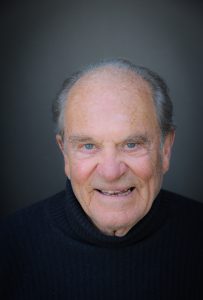
Flemming Heilmann was born 1936 in Malaya of Danish parents, spending his early childhood there until the threat of Japanese invasion forced an evacuation to Australia in 1941. Joined later by his father who escaped Singapore as she fell, the family spent World War II as refugees. As soon as the war ended in Europe, but before the Japanese capitulation, the family traveled home to Denmark on a troopship evading kamikaze attacks in the Pacific.
Flemming’s school education spanned Australia, Denmark – where he sank deep cultural roots – and formative years in the United Kingdom before he graduated from Cambridge with a law degree. During this period he spent time in British colonial Malaya during the communist uprising before its independence, in Swaziland under British rule, and in South Africa while apartheid laws were being put into place. During the post war recovery, Flemming developed an appreciation of America’s role in the rehabilitation of war torn Europe and an understanding of the mighty US economic engine driving economic, technological and social progress in the world. A 40-year executive career in industry took him back to South Africa for 17 years and on to the USA in the mid-1970s with stints in Europe and Canada. Flemming lives with his wife Judy in Rowayton, has four sons, a daughter and nine grandsons.
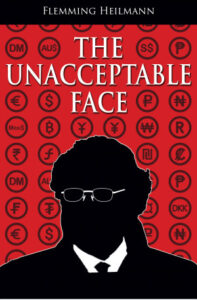
Flemming is a member of the DMA, and last spoke to us in early 2019, when he discussed his book, Odyssey Uncharted, a memoir of his World War II childhood and subsequent worldwide education. In his latest book, The Unacceptable Face, he relates his encounters with apartheid, socialism and iterations of capitalism on three continents during a career challenged by corporate and national politics. Some foes are engaged, others sidestepped. Immersion in disparate cultures spawns evolving beliefs and priorities, not always politically correct, just as traditional preconceptions are debunked.
Arranged by Bryan Hooper
Bryan’s notes on the talk:
Flemming Heilmann recounted to us highlights from his second memoir, The Unforgettable Face, which picks up from his first book, Odyssey Uncharted, with Flemming as a recently graduated Cambridge law student about to take up a position as a market research clerk in the South African subsidiary of the British firm, Metal Box Company, in 1959. He arrived in the country during the heyday of apartheid, the institutionalized racial segregation policy introduced by South Africa in 1948, and he experienced at first hand the problems involved in managing a company under conditions totally alien to those experienced in the UK in terms of labor relations.
He also managed to meet and began to understand the nascent opposition to the government as he was introduced to Helen Suzman, the solitary member of parliament for the Progressive party for 13 years, and also Arthur Goldreich and Harold Wolpe. The latter two owned Lilieleafs Farm, which served as the secret headquarters of the SA Communist Party, and who clandestinely encouraged the opposition African National Congress, which included the future President, Nelson Mandela, as one of its members. It was at an upscale dinner party held at the farm that Flemming and his fellow guests were served dinner by immaculately dressed waiters, one of whom happened to be Nelson Mandela. The government cracked down on the illegal farm operation in 1962 and subsequently jailed Mandela until 1990. Goldreich and Wolpe ended up in police detainment, but escaped dressed as Franciscan monks and made their way to Swaziland and eventual freedom.
Flemming was gradually promoted through the ranks of Metal Box, eventually becoming Managing Director and CEO in 1970, and ensured during his time in charge that employees were treated to a decent wage, and were given education and training opportunities that amounted to an additional 75% of costs above the wage bill. Nevertheless, Metal Box became a victim, amongst other companies, of an intense press exposé led by a UK journalist. In turn, this became the focus of a British parliamentary inquiry necessitating the provision of much data and Flemming’s being a witness at the subsequent hearings in Westminster, England. The allegations that his company were underpaying workers by 30% were repudiated and Flemming and his colleagues left the hearing to applause from the press.
Flemming moved on from South Africa to join Continental Can in the US at their Rowayton headquarters. Assignment to Europe to manage their German and Dutch manufacturing acquisitions gave Flemming a lesson in the socialistic operations prevailing in manufacturing at that time, but he managed to turn around the numbers and become profitable. Unfortunately, he was fired from his position for, as he says, speaking his mind, but moved on, still within the packaging industry, ending up in Canada as the President and CEO of a leveraged buyout firm in Toronto. Flemming is a great admirer of LBOs in general, but allows that there are excesses that can arise (hear his interesting anecdote on this subject during the talk on the video link on the website).
The next phase of his life drew Flemming into volunteer and charitable work in the US with several organizations associated with Denmark, including the Olympics and the Paralympics, and he is especially proud of his work with the Jacob Rees Neighborhood Settlement in New York, whose mission emphasizes self-help for immigrant populations and realistic goal-setting and accomplishments. He is more than pleased that 88% of participants in their programs graduated from high school compared with the average population at 48%.
Finally, Flemming talked briefly and passionately about two of his hobby-horses, public education for one, and inequality for another. Clearly, he believes that the future of the country depends on the establishment of a strong middle class, necessitating fair and equal access provision to education and training.
More details of Flemming’s fascinating life can be found in his book, The Unacceptable Face, and the video is on the website at https://youtu.be/xxgsLRYEXz0.
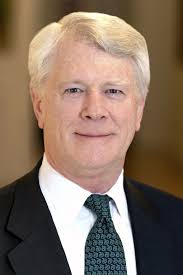
Ed Hynes, CFA was born and raised in Wilton, CT. He attended Wilton High School where he played both football and lacrosse. In 1977 Ed graduated from The George Washington University in Washington D.C. with a B.A. in Political Science. He subsequently spent most of his career in financial services. As an equity analyst, institutional salesperson and trader he worked with some of the premier investment banking firms in many of the world’s leading financial centers including New York, Tokyo, London, Chicago and San Francisco. In 2001 Ed became a Chartered Financial Analyst (CFA) charter holder, and is currently a Financial Advisor with Merrill Lynch in Westport, CT. He lives in Norwalk.
Ed first became interested in the Revolutionary War as a child when he learned his neighbor’s house was partially burned by the British during the Danbury Raid in 1777. He and his wife are fascinated by history and have visited many important battlefields both here and abroad. Ed has spoken to the DMA twice before, first in 2013 on the Battle of Ridgefield, and the second time in October, 2019, about the War on Long Island Sound.
Arranged by Gary Banks
Bryan Hooper’s notes on the talk:
Ed Hynes gave us a brief history of the War of 1812, leading into the origins of our national anthem, The Star-Spangled Banner.
The 1812 war was essentially due to a continuation of the grievances remaining from the Revolutionary War, and was started by a dispute over trade conditions. While the British had apparently agreed to a compromise on the problem, the lack of rapid communication facilities, such as a telegraph (invented 30 years too late), prevented the terms from being sent to the US in time to stop war being declared in June of 1812. It stretched over three years, and was notable for major naval victories by the Americans in the first year, the failure to take Canada in 1814, the inability of the British to win the Battle of Baltimore, and their defeat by the Americans at New Orleans in February 1815 – although the peace treaty had been signed on Christmas Eve, 1814! While the result of the war was officially a draw, it led to a period of American national unity, known as the Era of Good Feelings.
The back story of the national anthem started after the British had burned Washington in late August 1814, and then turned their attention to Baltimore, with the hope of consolidating their gains in the Chesapeake area. Major General Ross, in command of the British land forces, had been offered use of the house of Dr. William Beanes as his headquarters in Upper Marlboro, Maryland. However, during the campaign, British deserters who had looted local farms were arrested by Beanes, so Ross in retaliation had him arrested. (Ross was later killed by a sniper at the Battle of North Point before the Battle of Baltimore.) President Madison arranged for Francis Scott Key, a Georgetown lawyer, to deal with the British commanders in Baltimore for Beanes’s release. Those talks took place on board a British warship in the harbor in early September, and Key successfully negotiated for Beanes to be freed, citing the medical help the doctor had provided to wounded British prisoners. Key and his colleagues in the team were detained on board the British ship when the battle began on September 12th, and raged around them. He observed the bombs bursting in air over Fort McHenry, and in the morning of the next day saw the flag, spangled with fifteen stars, still flying over the fort’s ramparts. He wrote the poem the next day, and it was published the following week. Set to the music of John Stafford Smith – an English composer – it became popular as a patriotic song, being adopted for ceremonial events by the US Navy in 1889. The song was approved in 1916 by President Wilson to be played on military and other appropriate occasions, and finally became the national anthem following Congressional action and signature by President Hoover in March 1931.
Slides used in the presentation: Ed Hynes War of 1812 12-7-20
Video of Ed’s presentation: https://youtu.be/XEmuLSZjw0Y

